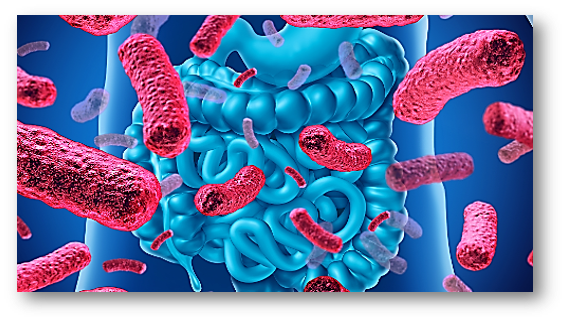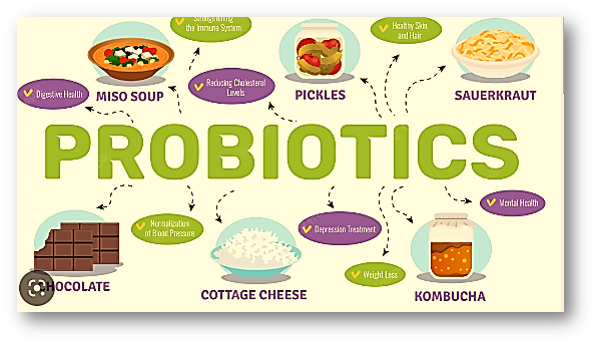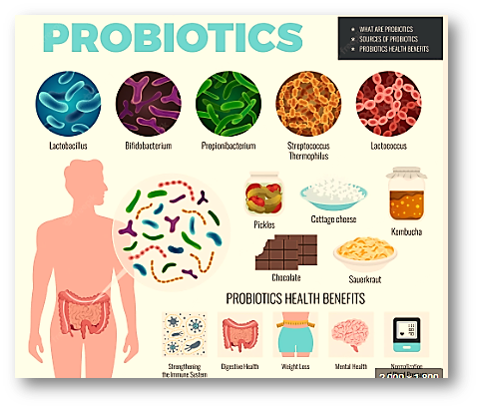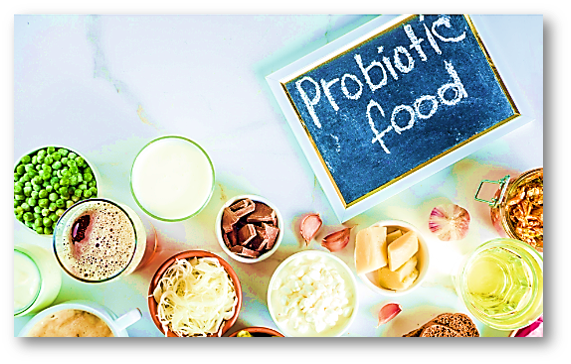A probiotic is a type of live microorganism that is similar to the beneficial microorganisms found in the human gut. They are often called “good” or “helpful” bacteria because they can help keep the gut healthy. Probiotics are found in some foods and supplements, and they are also available in the form of capsules, tablets, and powders. Some common types of probiotics include Lactobacillus and Bifidobacterium. Probiotics are thought to have a number of health benefits, including helping to balance the bacteria in the gut, improving digestive function, and strengthening the immune system. However, more research is needed to fully understand the potential health benefits of probiotics.
WHAT ARE PROBIOTICS GOOD FOR??

Probiotics are thought to have a number of potential health benefits. Some of the most well-studied benefits include:
Digestive health:
Probiotics may help improve digestion by increasing the production of enzymes that break down food and by helping to balance the bacteria in the gut.
Immune system support:
Probiotics may help strengthen the immune system by increasing the production of antibodies and enhancing the activity of immune cells.
Mental health:
Some studies have suggested that probiotics may help improve mental health by reducing anxiety and depression and by helping to regulate the production of neurotransmitters like serotonin.
Skin health:
Some research has suggested that probiotics may help improve skin health by reducing inflammation and improving the skin’s barrier function.
Allergies and asthma:
Some studies have suggested that probiotics may help reduce the severity of allergies and asthma.
Urinary and genital health:
Probiotics may help improve urinary and genital health by helping to prevent infections and by reducing the risk of developing conditions like vaginitis.
It’s important to note that more research is needed to fully understand the potential health benefits of probiotics and to determine the optimal dosage and duration of use.
THE TYPE OF FOOD HAS PROBIOTICS!!

Probiotics are found naturally in a variety of fermented foods, including:
Yogurt:
Many types of yogurt contain live cultures of beneficial bacteria, including Lactobacillus and Bifidobacterium.
Kefir:
Kefir is a fermented milk drink that is made with kefir grains and contains a variety of beneficial bacteria and yeast.
Sauerkraut:
Sauerkraut is a type of fermented cabbage that is rich in probiotics.
Kimchi:
Kimchi is a spicy fermented vegetable dish that is commonly made with Napa cabbage and a variety of seasonings.
Pickles:
Pickles are cucumbers that have been preserved in a vinegar brine and are a good source of probiotics.
Miso:
Miso is a fermented soybean paste that is commonly used in Japanese cuisine.
In addition to these foods, probiotics are also available in the form of supplements, including capsules, tablets, and powders. It’s important to note that the probiotic content of fermented foods can vary. So it’s always a good idea to check the label to see what types and amounts of probiotics are present.
ARTIFICIAL AND NATURAL PROBIOTICS!!
Artificial probiotics are microorganisms that are produced in a laboratory setting and are not found naturally in the human body. These probiotics are often created using genetic engineering techniques. And may be made from a variety of different microorganisms, including bacteria and yeast.
On the other hand, natural probiotics are microorganisms that are found naturally in the human body. OR that occur naturally in certain fermented foods. These probiotics are not produced in a laboratory setting and are not genetically modified.
Some people may prefer natural probiotics because they are derived from sources that are found in nature. And are not genetically modified. However, it’s important to note that both artificial and natural probiotics can have potential health benefits. And the choice between the two will depend on an individual’s preferences and needs.
WHO SHOULD NOT TAKE PROBIOTICS??
There are some individuals who may not be suitable candidates for probiotic use. OR who may need to use caution when taking probiotics. These include:
People with compromised immune systems:
Probiotics may not be suitable for individuals who have compromised immune systems, such as those with HIV/AIDS or cancer, as they may be more susceptible to infections.
People with certain medical conditions:
Probiotics may not be appropriate for individuals with certain medical conditions, such as pancreatitis or liver disease. It’s important to speak with a healthcare provider before taking probiotics if you have any pre-existing medical conditions.
Infants born prematurely:
Probiotics may not be suitable for infants born prematurely, as they may be more at risk of infections.
People who are allergic to certain probiotics:
Some people may be allergic to certain strains of probiotics, or to the proteins and additives used in probiotic supplements. It’s important to be aware of any allergies you have before taking probiotics.
It’s always a good idea to speak with a healthcare provider before taking probiotics, as they can help to recommend a product that is appropriate for your age, health needs, and any pre-existing medical conditions.
SUPPLEMENTS AND PROBIOTICS!!
Supplements are substances that are taken orally and are intended to add to or improve the intake of nutrients or other substances that are essential for good health. Probiotics are a type of dietary supplement that contain live microorganisms that are similar to the beneficial microorganisms found in the human gut. These microorganisms, which are also known as “good” or “helpful” bacteria, are thought to have a number of potential health benefits, including helping to balance the bacteria in the gut, improving digestive function, and strengthening the immune system.
Probiotics are available in a variety of forms, including capsules, tablets, and powders, and they can be found in some fermented foods, such as yogurt and kefir. Some people take probiotics as a way to support their overall health and well-being, while others may take them to help address specific digestive or immune issues.
It’s important to note that probiotics are just one type of supplement and that there are many other types of supplements available on the market, including vitamins, minerals, and herbs. It’s always a good idea to speak with a healthcare professional before taking any type of supplement.
IS IT GOOD TO TAKE PROBIOTICS EVERY DAY??
While probiotics are generally considered safe and are widely used, there are some potential disadvantages to taking them in routine. Some people may experience side effects when they take probiotics, including gas, bloating, and diarrhea. These side effects are usually temporary and go away on their own, but they can be unpleasant.
It’s also important to note that probiotics are not a substitute for a healthy diet and lifestyle. While probiotics may provide some health benefits, they should not be relied upon as a sole source of nutrition or as a replacement for proven medical treatments.
Additionally, some people may be allergic to probiotics or may have an intolerance to certain types of bacteria. It’s always a good idea to speak with a healthcare professional before starting any new supplement regimen, including probiotics, to ensure that they are safe and appropriate for you.
ARE PROBIOTIC BACTERIA CAN SOMETIMES CAUSE ANY OPPORTUNISTIC INFECTION??
Probiotic bacteria are generally considered safe and are not known to cause opportunistic infections. Opportunistic infections are infections that occur more frequently or are more severe in people with weakened immune systems. Probiotics are thought to have a number of potential health benefits, including helping to strengthen the immune system.
However, it’s important to note that all dietary supplements, including probiotics, carry some risks. Some people may experience side effects when they take probiotics, including gas, bloating, and diarrhea. These side effects are usually temporary and go away on their own, but they can be unpleasant.
It’s also possible, although rare, for probiotics to cause infections in people with compromised immune systems. If you have a weakened immune system or a serious illness, it’s important to speak with a healthcare professional before taking probiotics or any other dietary supplement.
PROBIOTIC RECOMMENDATION FOR CHILDREN!!

Probiotics are beneficial bacteria that can be found in certain foods or supplements. They can help to restore the balance of good bacteria in the gut, which is important for overall health. Some studies have suggested that probiotics may be helpful for certain digestive issues in children, such as diarrhea and constipation.
There are many different probiotics available, and the best one for a child will depend on their age and specific health needs. It’s a good idea to talk to a doctor or a pharmacist before giving a child any type of probiotic supplement. They can help to recommend a product that is appropriate for your child’s age and needs. Some probiotic supplements are specifically formulated for children, and these may be a good option.
In addition to supplements, there are also many food sources of probiotics that may be suitable for children. For example, fermented foods such as yogurt, kefir, and sauerkraut contain live cultures of beneficial bacteria. It’s always a good idea to speak with a healthcare provider before making any changes to a child’s diet, including introducing new sources of probiotics.
PROBIOTIC INTAKE DURING PREGNANCY!!
There is some evidence to suggest that probiotics may be beneficial for pregnant women and their developing babies. For example, some studies have found that taking probiotics during pregnancy may reduce the risk of certain complications, such as preterm birth and gestational diabetes.
Probiotics may also be helpful for pregnant women who experience digestive issues, such as constipation or diarrhea. However, it’s important to note that more research is needed to fully understand the potential benefits and risks of probiotic use during pregnancy.
If you are pregnant and considering taking probiotics, it’s a good idea to speak with a healthcare provider first. They can help to recommend a safe and appropriate product and advise you on the proper dosage and duration of use. In general, it’s best to stick with products that have been well-studied and have a good safety profile.
PROBIOTIC INTAKE DURING WEIGHT LOSS!!
There is some evidence to suggest that probiotics may be helpful for weight loss and weight management. Probiotics are live microorganisms that are similar to the beneficial bacteria found in the human gut. They may help to improve the balance of good and bad bacteria in the gut, which can in turn support overall health and well-being.
Some studies have found that taking certain probiotics may help to reduce body weight and body fat, as well as improve other markers of metabolic health, such as blood sugar control and cholesterol levels. However, it’s important to note that more research is needed to fully understand the potential benefits and risks of probiotic use for weight loss.
If you are considering taking probiotics for weight loss, it’s a good idea to speak with a healthcare provider first. They can help to recommend a safe and appropriate product and advise you on the proper dosage and duration of use. In general, it’s important to remember that probiotics are not a magic solution for weight loss, and they should be used as part of a comprehensive weight management plan that includes a healthy diet and regular physical activity.
WHAT ARE THE SIGNS YOU NEED PROBIOTICS??

Probiotics are live microorganisms that are similar to the beneficial bacteria found in the human gut. They are often taken to restore the balance of good and bad bacteria in the gut, which can be disrupted by a variety of factors, such as poor diet, stress, and certain medications.
There are many potential signs that you may benefit from probiotics, but it’s important to note that more research is needed to fully understand their potential benefits and risks. Some people may experience digestive issues, such as constipation, diarrhea, or bloating that may improve with probiotic use. Others may take probiotics to support their overall health and well-being or to prevent certain health conditions.
If you are considering taking probiotics, it’s a good idea to speak with a healthcare provider first. They can help to determine if probiotics are appropriate for you, and recommend a safe and appropriate product based on your age, health needs, and any pre-existing medical conditions.
KEYWORDS: Microbiome, Prebiotics, Synbiotics, Live cultures, Beneficial bacteria, Gut health, Fermented foods,
REFERENCES:
https://academic.oup.com/jn/article/130/2/415S/4686435
https://www.academia.edu/download/48017273/j.1440-1711.2000.00887.x20160813-20532-fwojlg.pdf


Pingback: EVERY MORNING IS A NEW OPPORTUNITY!! - Life Biologs
Pingback: CONTAMINATED FOOD POISONING!! - Life Biologs
Pingback: IMMUNITY AND IMMUNE BOOSTERS!! - Life Biologs